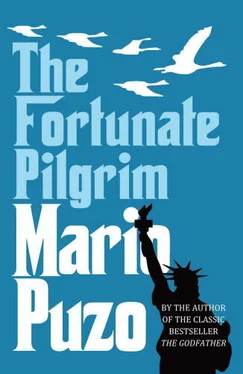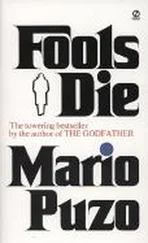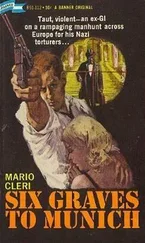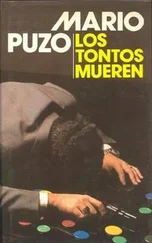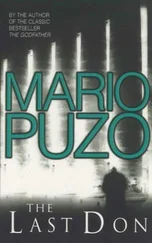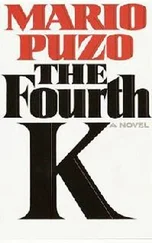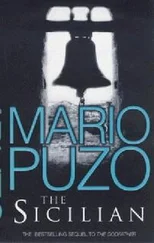Octavia wanted to go to night school, study to become a teacher. Lucia Santa refused permission. No; she would become ill working and going to school. “Why? Why?” the mother asked. “You, such a beautiful dressmaker, you earn good money.” The mother objected out of superstition. This course was known. Life was unlucky, you followed a new path at your peril. You put yourself at the mercy of fate. Her daughter was too young to understand.
Unexpectedly, shamefacedly, Octavia had said, “I want to be happy,” and the older woman became a raging fury, contemptuous—the mother, who had always defended her daughter’s toity ways, her reading of books, her tailored suits that were as affected as a lorgnette. The mother had mimicked Octavia in the perfect English of a shallow girl, “ You want to be happy.” And then in Italian, with deadly seriousness, “Thank God you are alive.”
IN THE COOL evening air Octavia accepted her mother’s act of peace, sat gracefully, hands folded in her lap. Remembering the quarrel, she mused on the mystery of her mother’s speaking perfect English when mimicking her children. Out of the corner of her eye Octavia saw Guido, the dark son of the Panettiere, wavering through the warm summer night toward the light of her white blouse. In his dark, strong hand he bore a tall paper cup of fruit ice, lemon and orange, which he gave her, almost bowing, whispering hurriedly something that sounded like “Don’t spoil your shirt,” and then hurrying back to the stand to help his father. Octavia smiled, took a few mouthfuls out of politeness, and passed the cup to her mother, who had a passion for ices and sucked on the cup, greedy as a child. The buzz of the old women’s voices went on.
Her stepfather turned the corner of 31st Street and entered the Avenue, wheeling the baby carriage before him. Octavia watched him go from 31st Street to 30th and back again. And as her mother’s irony bewildered her, this tenderness of the stepfather confused her emotions. For she hated him as someone cruel, villainous, evil. She had seen him give blows to her mother, act the tyrant to his stepchildren. In the faded memories of Octavia’s childhood his courting of her mother followed too swiftly the day of her real father’s death.
She wanted to look at the sleeping baby, the little sister she loved passionately, though she was her stepfather’s child. But she could not bear speaking to the man, looking into his cold blue eyes and harsh angular face. She knew her stepfather hated her as she hated him and that each feared the other. He had never dared strike her as he sometimes struck Vinnie. And she would not have minded his blows to his stepson if he had been paternal in other ways. But he brought presents for Gino and Sal and Aileen and never for Vincent, though Vincent was a child still. She hated him because he never took Vincent for walks or haircuts with his natural children. She feared him because he was strange—the evil mysterious stranger of story books, the blue-eyed Italian with the Mephistophelean face; and yet she knew that really he was an illiterate peasant, a poor, contemptible immigrant who gave himself airs. One day she had seen him on the subway pretending to read a newspaper. She had rushed to tell her mother, laughing, contemptuous. Her mother had only given her a curious smile and said nothing.
BUT NOW ONE of the black-clad women was telling a story about a villainous young Italian girl (born in America, naturally). Octavia attended. “Yes, yes,” the woman said. “They were married for a month, they had finished with their honeymoon. Oh, she loved him. She sat on his lap in his mother’s home. When they visited she played with his hand. Like this—” two gnarled hands with warty fingers linked themselves lovingly, obscenely, in the storyteller’s lap— “and then they went to dance, in the church. The foolishness of those young priests who do not even speak Italian! Her husband won a prize for entering the door. He took the prize and dropped to the earth, dead. His poor heart, he was always sickly. His mother had always warned him, cared for him. But now. The young bride, dancing with another man, is told. Does she rush to the side of her beloved? She shrieks. She cried, ‘No, no. I cannot.’ She fears death like a child, not a woman. The loved one lies in his own piss alone, but she no longer loved him. She cries out, ‘No, I will not look at it.’ ”
Slyly Zia Louche, her tongue rolling up both meanings, said, “Ah! You may be sure she looked at It when It was alive.” A great burst of coarse laughter from all the women filled the Avenue, drawing jealous looks from other circles of women. Octavia was disgusted, angry that even her mother was smiling with delight.
To more serious things. Lucia Santa and Zia Louche stood fast against the rest of the circle on a point of ancient history, the exact details of a scandal twenty years ago across the sea in Italy. It amused Octavia to see her mother defer to Zia Louche and the old crone valiantly do battle for her mother, each of them treating the other like a duchess. Her mother turning to Zia Louche and asking respectfully, “ E vero, Comare ?” And Zia Louche always answering imperiously, “ Sì, Signora, ” showing no callow familiarity before the others. Octavia knew the relationship behind this, her mother’s gratitude for that valuable alliance in the hour of her most terrible misfortune.
But the quarrel was too finely drawn and Octavia became bored. She got up to look at her baby half sister, staring down at the carriage, not greeting her stepfather. She gazed down at the baby girl with an overwhelming tenderness, an emotion she did not even feel for Vincent. Then she walked toward the corner of 31st Street to look for Gino, saw him playing, saw little Sal sitting on the curb. She took Sal back to his mother. Vinnie was missing. Looking up, she saw him far above her, sitting on the window sill of the apartment, dark, motionless, guarding them all.
Frank Corbo, somber, watched his big stepdaughter lean over his baby. Strange with blue eyes, object of amusement (what Italian male wheeled his baby in the summer night?), illiterate, his mind mute, he saw the beauty of the stone city in darkness, felt the hatred of his stepdaughter without returning hatred. The harsh thin face concealed a wordless and consuming anguish. His life was a dream of beauty felt and not understood, of love twisted into cruelty. Countless treasures went by like shadows, the world was locked away. In search of deliverance, he would leave the city tonight and desert his family. In the early morning hours, while it was still dark, he would meet a farm truck and disappear without a word, without quarreling or giving blows. He would work in the brown and green fields of summer, gain peace from love, restore his strength.
He suffered. He suffered as a deaf-mute suffers who would sing seeing beauty, who cannot cry out in pain. He felt love and could not give caresses. There were too many people sleeping in the rooms around him, too many beings walked the streets around him. He dreamed terrible dreams. Tapestried on black, his wife and children circled him round, and from their foreheads each drew a dagger. He had cried out.
It was late, late; the children should be in bed, but it was still too hot. Frank Corbo watched his son Gino run crazily in some sort of tagging game incomprehensible to the father, as was the child’s American speech, as were the books and newspapers, the colors of the night sky, the beauty of the summer night and all the joys of the world he felt cut off from, all colored with pain. The world was a great mystery. Vast dangers that others could guard their children against would bring him and his loved ones into the dust. They would teach his children to hate him.
Читать дальше
